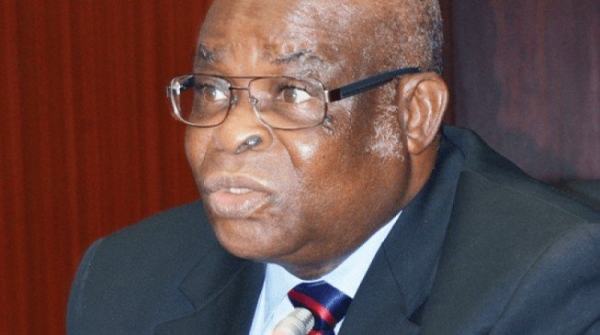Former Chief Justice of Nigeria (CJN), Justice Walter Onnoghen, is set to resume his legal proceedings against the Code of Conduct Tribunal (CCT) judgment that led to his removal from office in 2019.
This action will take place on Tuesday, 20th August 2024, at the Court of Appeal in Abuja.
Naija News reports that the legal action was initiated in April 2019.
Justice Onnoghen is seeking the Court of Appeal’s intervention to nullify and annul the CCT’s decision issued against him on April 18, 2019, on several grounds.
In his appeal, which is designated CA/ABJ/375 & 376 & 377/2019, Justice Onnoghen, represented by his lead counsel, Adegboyega Awomolo, SAN, is petitioning the appellate court to overturn his conviction, primarily on the grounds of lack of jurisdiction, bias, and absence of a fair hearing.
A notice for hearing of the appeal just sighted by newsmen on Monday is entitled, “CA/ABJ/375 & 376 & 377/2019 BTW: Justice Onnoghen and FRN”.
It read, “Please take notice that the above matter is listed for hearing on Tuesday the 20th day of August 2024 at 9 o clock in Court Appeal, Abuja Division.
“Please take note that this serves as a hearing notice”.
In 2019, the Code of Conduct Tribunal (CCT) convicted Onnoghen on all six counts of breaching the Code of Conduct for Public Officers, which were brought against him by the federal government during his tenure as the head of the judiciary in the country.
In the preliminary ruling delivered by the Chairman of the CCT, Danladi Yakubu Umar, it was mandated that Onnoghen be immediately removed from his position as Chief Justice of Nigeria (CJN).
Furthermore, the Tribunal revoked his previous positions, including Chairman of the National Judicial Council (NJC) and Chairman of the Federal Judicial Service Commission (FJSC).
Additionally, the Tribunal ordered the forfeiture of his five bank accounts and the assets within those accounts that Onnoghen failed to disclose in his asset declaration form submitted to the Code of Conduct Bureau (CCB), an agency of the Federal Government.
Despite being on suspension since January 25, 2019, and having resigned on April 4, the Tribunal still mandated his removal from office as Chief Justice of Nigeria and Chairman of both the National Judicial Council and the Federal Judicial Service Commission.
However, in response to the decision of the CCT, Onnoghen approached the Court of Appeal in Abuja in 2019, presenting 16 grounds for seeking the quashing of his conviction by the Tribunal.
He argued that the Danladi Umar-led CCT panel committed errors in law and caused a miscarriage of justice against him by failing to decline jurisdiction over the six-count charges against him. He contended that the Chairman of the CCT should have recused himself from presiding over his trial.
In his application for relief, Onnoghen sought an order to set aside his conviction, quash the order for the forfeiture of his assets, and discharge and acquit him of all the charges levelled against him.
Onnoghen also highlighted specific errors in the verdict of the CCT, arguing that as a judicial officer at the time the charges were filed on January 11, 2019, he could not be subjected to the jurisdiction of the lower tribunal.
The former CJN’s application reads: “On the authority of Nganiiwa v. FRN (2018) 4 NWLR (Pt. 1609) 30: at 340. 341, only the National Judicial Council (NJC) has the power to discipline the Appellant for misconduct and not the lower tribunal.
“The lower tribunal had in the case of FRN V. Sylvester Nwali Nguta in charge No: CCT/ABJ/01/2017 delivered on 9th January 2018, affirmed the position of the Court in FRN Nganjiwa v. FRN and dismissed the charges and acquitted and discharged Justice Ngwuta being a Judicial Officer subject only to the discipline of the National Judicial C0uncil.
“The lower tribunal has no jurisdiction over serving judicial officers such as the appellant, save the National Judicial Council.
“The Motion on Notice dated 14th January 2019, challenging jurisdiction, ought to be granted in all material particular as it purports to save the lower tribunal of a needless futile exercise.
“The lower tribunal erred In law when it dismissed the Appellant’s Application seeking the chairman to recuse himself from further proceedings on the ground of real likelihood of bias and thus occasioned a miscarriage of justice.
“The Appellant has alleged that the chairman of the lower tribunal is biased towards him as a result of open remarks in the tribunal as well as the manner in which the proceedings were being conducted.”
Contrary to the CCT finding, Onnoghen, said he did not admit the fact of non-declaration of Assets from 2005 as the Justice of the Supreme Court, adding that he only stated that he did not declare in 2009 as required because he forgot.
Onnoghen challenged the order for the confiscation of his assets on the grounds that the assets were legitimately acquired, as against the provisions of paragraph three of section 23 of the CCB Act, which only permits the seizure of such assets “if they were acquired by fraud.”
He faulted the failure of the prosecution to present the petitioner, Denis Aghanya, before the tribunal whose petition led to the charges against him.
Onnoghen maintained that all the allegations brought against him “constitute no offence and should therefore not have formed the basis for his conviction”.
The former CJN asked the Court of Appeal to issue some orders against the CCT judgment among which are that the tribunal lacks the jurisdiction to entertain the case and that its Chairman ought to have recused itself from the proceedings.
Onnoghen therefore applied for an order setting aside his conviction and another one setting aside the order for forfeiture of his assets made by the Tribunal as well as to discharge and acquit him from the charges.


